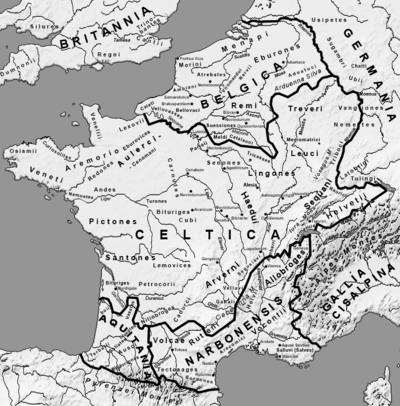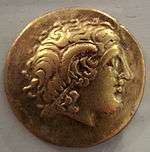Turones
The Turones were a Celtic tribe of pre-Roman Gaul, dwelling around modern-day Tours, in the Touraine region.[1][2]


Name
They are mentioned as Turonos and Turonis by Caesar (mid-1st c. BC),[3] as Turones by Pliny (1st c. AD),[4] as Turoni by Tacitus (early 2nd c. AD),[5] and as Touroúpioi (Τουρούπιοι) by Ptolemy (2nd c. AD).[6][7]
The meaning of the name Turones , attested by the 1st c. BCE (Caesar), is unclear.[8] It is probably a Gaulish name, maybe related to the root tura- ('strong, rich').[8]
The city of Tours, attested as apud Toronos in the 6th c. CE (civitas Turonus in 976, Turonis in 1205, Tors in 1266), and the Touraine region (Turonice civitatis in 774, vicecomes Turanie in 1195–1196, Touraine in 1220), are named after the tribe.[8]
The ancient records of Britain, cited by Geoffrey of Monmouth, Nennius, and the anonymous author of Jesus College MS LXI, attribute the name to Turnus, a nephew of Brutus of Troy who was buried there after dying in battle protecting the Britons from King Goffar of Aquitaine and the Poitevins.[9]
Geography
Their territory spanned the actual département of Indre-et-Loire, and parts of the Indre and Vienne départements. The principal city of the Turones' territory was Caesarodunum,[10] the modern city of Tours. Before the Roman conquest, the main oppidum of the tribe was probably the oppidum of Fondettes,[11] or maybe the one which was found behind the Amboise Castle, called Oppidum des Châtelliers.[12]
See also
- List of ancient Germanic peoples and tribes
References
- Scott, John C. (2011-03-24). Battle of Tours. eBookIt.com. p. 10. ISBN 9781456601485.
- Rice, Jason (August 2011). Kingdoms of Legend: Knights of France. Interaction Point Games. p. 30. ISBN 9781936326112.
- Caesar. Commentarii de Bello Gallico, 2:35:3; 8:46:4
- Pliny. Naturalis Historia, 4:107
- Tacitus. Annales, 3:41
- Ptolemy. Geōgraphikḕ Hyphḗgēsis, 2:8:11
- Falileyev 2010, p. entry 3412.
- Nègre 1990, p. 158.
- Chronicle of the Early Britons
- Brooke, Anna E.; Jordi, Nathalie; Sommer, Lauren; Sussman, Anna (2007-06-05). MTV France. John Wiley & Sons. p. 149. ISBN 9780764587702.
- Ancient Society (in French). Katholieke Universiteit te Leuven. 1970. p. 158.
- Adolph, Anthony (2015-11-30). Brutus of Troy: And the Quest for the Ancestry of the British. Pen and Sword. p. 80. ISBN 9781473849204.
Bibliography
- Falileyev, Alexander (2010). Dictionary of Continental Celtic Place-names: A Celtic Companion to the Barrington Atlas of the Greek and Roman World. CMCS. ISBN 978-0955718236.
- Nègre, Ernest (1990). Toponymie générale de la France (in French). Librairie Droz. ISBN 978-2-600-02883-7.CS1 maint: ref=harv (link)
